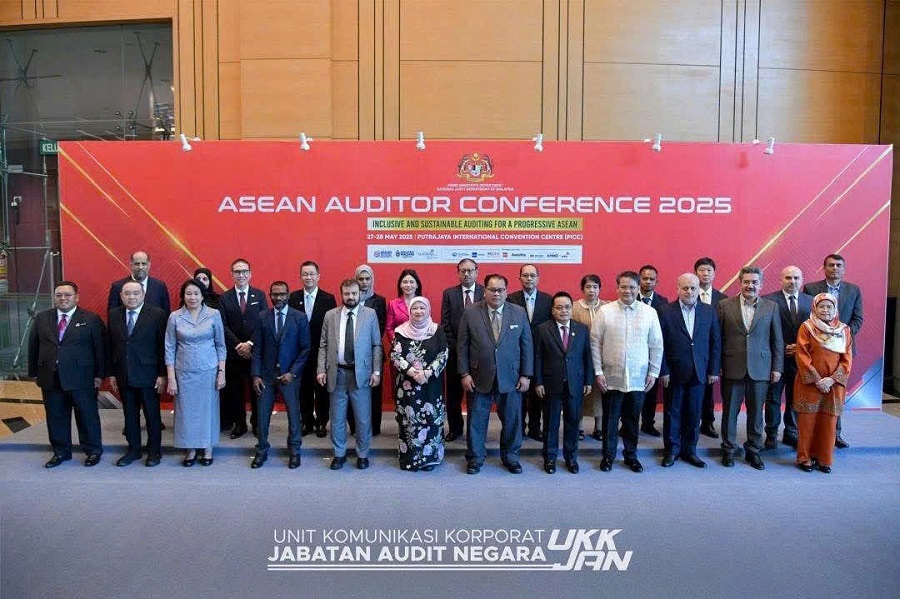(sav.gov.vn) – On 27 May, the 2025 ASEAN Auditors Conference officially commenced at the Putrajaya International Convention Centre, Malaysia. The delegation from the State Audit Office of Viet Nam (SAV), led by Deputy Auditor General Ha Thi My Dzung, made significant technical contributions to the conference discussions.

The event brought together nearly 2,000 participants, including representatives from Supreme Audit Institutions (SAIs) across the ASEAN region and the Asian Organisation of Supreme Audit Institutions (ASOSAI), as well as delegates from international professional associations, government regulatory bodies, and the private sector.
In his opening remarks, Tan Sri Shamsul Azri bin Abu Bakar, Secretary-General of the Government of Malaysia, emphasised the pivotal role of SAIs in promoting accountability, transparency, and efficiency in public governance throughout the ASEAN region. Following this, Dr Kao Kim Hourn, Secretary-General of ASEAN, reaffirmed the critical importance of regional cooperation and collaboration among SAIs in building resilient public financial systems capable of adapting to contemporary challenges.
During the high-level dialogue session, representatives from the SAIs of Malaysia, the Philippines, and Indonesia highlighted that a key priority for ASEANSAI in 2025 is to enhance the effectiveness of public sector auditing by strengthening the implementation of audit recommendations, particularly through follow-up audits. Speakers from the Malaysian and Indonesian SAIs shared practical experiences on improving audit impact through systematic monitoring and implementation of recommendations.
Dato' Seri Wan Suraya Wan Mohd Radzi, Auditor General of Malaysia, introduced key provisions of the Amended Audit Act 2024, which grants the SAI expanded authority to monitor and address serious violations, as well as to coordinate with stakeholders including Parliament, enforcement agencies, and audited entities.
Meanwhile, the representative from the Audit Board of Indonesia (BPK) underscored the application of artificial intelligence (AI) in their online monitoring system, SIPTL, a digital platform developed to track, analyse, and verify the implementation of audit recommendations. This tool enables BPK to efficiently monitor progress, propose data-driven solutions, and exemplifies how digital transformation is reshaping audit practices across the region while enhancing the practical value of audit reports.
On the sidelines of the conference, the SAV delegation held a bilateral meeting with the delegation of the SAI UAE. During the meeting, representatives of SAI UAE affirmed their willingness to share technical experiences in IT applications and best practices in leveraging AI within audit operations.
Notably, SAI UAE has successfully integrated advanced technologies into sampling procedures and audit methodology development, thereby enhancing the effectiveness and credibility of audit outcomes. They are also actively engaged in auditing state-owned enterprises (SOEs), contributing to domestic financial reporting reforms.
Deputy Auditor General Ha Thi My Dzung highlighted the alignment in mandates between the SAV and SAI UAE, with both institutions tasked with auditing SOEs, providing a strong foundation for Viet Nam to learn from the UAE’s experience in applying technology to state-owned enterprise audits.
She also noted that the SAV has placed increasing emphasis on strengthening the use of IT and digital technologies in audit practices. Therefore, the sharing of experience from SAI UAE will significantly contribute to enhancing the quality and effectiveness of public audits in Viet Nam.
The leadership of both SAIs reached a mutual understanding on the importance of organising reciprocal study visits to share knowledge in areas of common interest. Both parties also expressed their intention to move towards signing a Memorandum of Understanding (MoU) on cooperation, laying the groundwork for a long-term, sustainable bilateral relationship. This partnership will also help expand collaboration at regional and international forums, particularly within the communities of the International Organisation of Supreme Audit Institutions (INTOSAI) and ASOSAI.